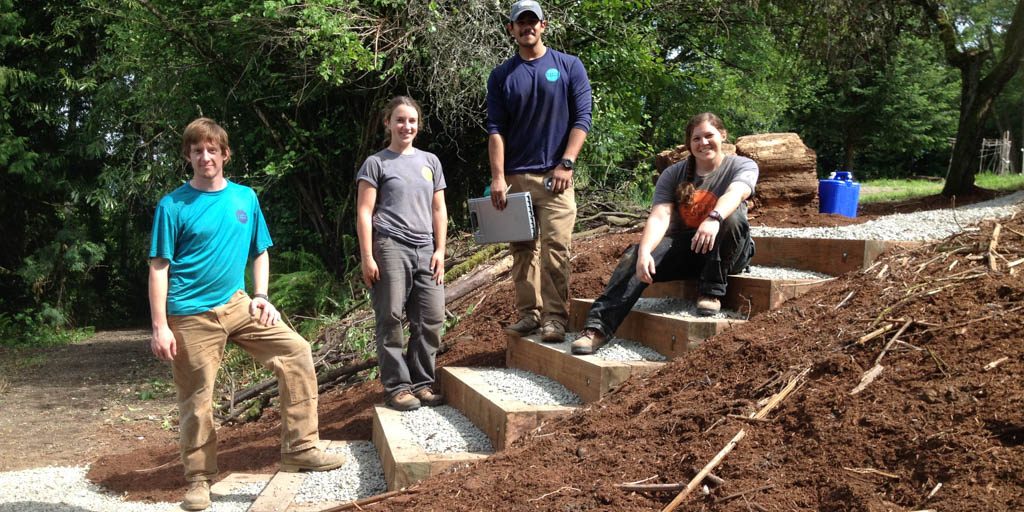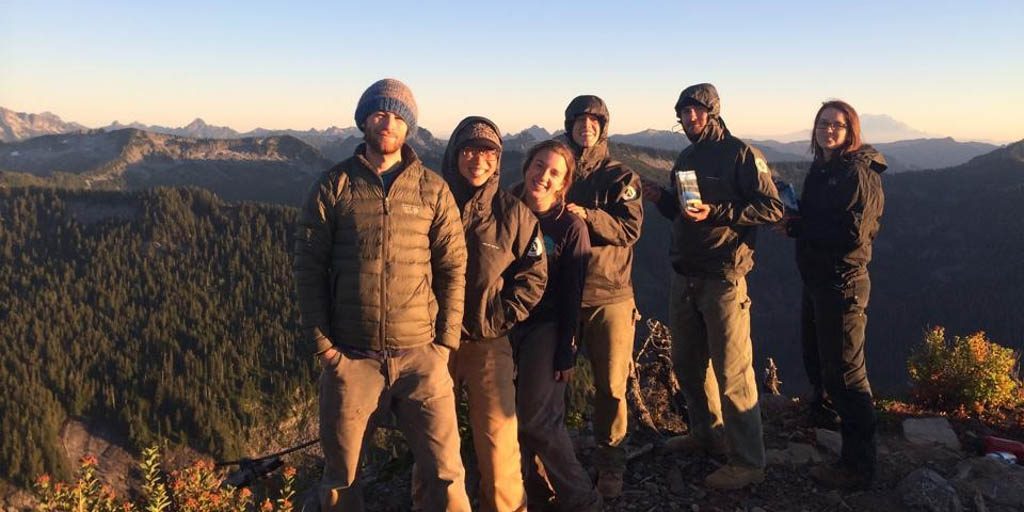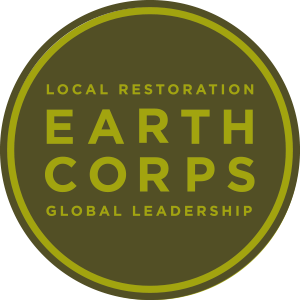Alum Highlight – Nicole Marcotte
Nicole Marcotte
Corps Member 2014
Stewardship Coordinator for Forterra
First, describe your path from where you grew up to when you were at EarthCorps to where you are now.
I was lucky to grow up in the forest of a very small town in Massachusetts. I was always very connected to the outdoors and spent a lot of time going outside in the woods and exploring, because there wasn’t much else to do. I didn’t realize how much my time amongst the trees and fresh air had impacted me until later in life.
When I went away to college, I was geared up to become a journalist, but that all changed when I took my first Environmental Studies class. As I began to understand the depth and importance of all of the environmental problems facing our world, my interests dramatically shifted. I wanted to do work that not only protected the environment but also connected people with green spaces to give others the chance to grow up and appreciate their surroundings as I did. I interned with the Nature Conservancy and the US Fish and Wildlife Department. While working in the field tromping around and monitoring tree health, I was so excited to go to work every day.
After college, I had trouble finding a full time job, especially one with environmental fieldwork involved. I landed a communications job at a for-profit company called Tetra Tech, which tackled international development projects all over the globe. In the bigger scheme of things, they were doing really awesome work for the environment, but I was so disconnected from the on-the-ground work. While editing other people’s slide decks and word documents in my cubicle, I was losing a sense of myself. I wanted to break the mold by getting back out into the field. So I browsed online for environmental service programs, and I found EarthCorps. EarthCorps attracted me because it offered the opportunity of learning both hard labor skills and leadership skills. So I decided to go for it, and moved to the other side of the country without ever visiting Seattle before to pursue my dream career; it was definitely a scary transition, but it was what I needed to do to get connected to the work that I wanted.
My Corps year pushed me to not just to grow physically and learn how to do restoration work, but also gave me the self-confidence boost that I needed. I had never used tools before, and having to push myself to learn made me realize my true capabilities. I fell in love with the work and knew that I wanted to continue to make a beneficial impact on the environment with my own two hands.

Now, I work at Forterra here in Seattle in their Restoration and Stewardship Department, working on their Green City Partnerships. My main priority at work is to connect communities with their local greenspaces. I’ve managed a lot of my own projects, ranging from hosting trainings on habitat restoration to coordinating volunteer events of all sizes. My favorite aspect of the work is getting to connect with volunteers. To see a little kid smiling while planting a tree just melts my soul. In this field, we’re really lucky to get to see the gratification of the hard work that we do. It can be hard to wake up on a rainy Saturday morning to lead an event, but so often I will have an impactful interaction with a volunteer and it’ll make it all worth while.
Would you speak about the role of green spaces in cities?
Just a couple weeks ago, I had a school group out with me helping to spread mulch at one of our restoration sites. The event was coming to an end and the group was getting excited to play on the nearby playground. One of the students, a mere six-year-old girl, wasn’t like her classmates and didn’t want to go play on the playground. She said, “we can’t, we have to keep working because the forest needs to get healthy!” That moment really stuck with me.
Knowing that you’re making that kind of impact and impression on someone to have them care for and view the environment from a different perspective is so gratifying. It comes back to my realization that not everyone has the privilege of going out to the forest and exploring. Giving people the opportunity to connect with the spaces they have has been the most gratifying aspect of being in this field.
“Now more than
ever, the connection
of green spaces and
community allows
us to relax,
decompress, and
clear our minds.
That is so critical.
Green spaces gives
us a space to learn
and engage. The
human element is
really huge.”
Would you talk about your personal evolution as a woman in outdoor
spaces?
When I went out for job interviews after college, I saw a lot of men getting hired in the positions I was going for; whether or not they were being discriminatory to me, I’ll never know, but I internalized that as “I come off as too fragile or girly for them to be confident in my skills in the field.” I’ve always been very feminine, which is usually clearly expressed through the way I dress, and I even wanted to be a fashion journalist when I was younger. I started creating this idea in my head that someone feminine like me couldn’t find success in the environmental field. But so many bad ass women were at EarthCorps, and while I was still struggling with confidence about never using tools, I had them to look up to. Some people were clearly made for the work, but I never saw myself like that. I had to prove to myself that I could be bad ass too. I think I needed to work with EarthCorps to realize that this work isn’t gender specific. If it wasn’t for EarthCorps, I could see myself still at a cubicle, not being my full self.

How has your definition of success changed over time?
My new definition of success is all about feeling happy with your day-to-day routines. Your job takes up most of your week, so if you feel empowered and excited to go to work every day, then you should consider that as success. I have found that success working in the field of habitat restoration and community engagement. I’m grateful that I can get paid to help the environment, but I’d be willing to do AmeriCorps again if I got to keep doing what I’m passionate about. Success isn’t all about how much money is in your pocket at the end of the day; it’s about the lasting impression that you leave on the earth and those around you.

